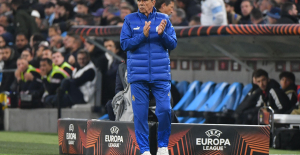Felipe VI, has claimed responsibility for this Thursday the role of his father, Juan Carlos I, “a witness and a participant to direct [the] profound and significant transformation of Spain” after the recovery of democracy. It has also emphasized the task of his mother, Queen Sofía, at the time of “project” the cooperation and solidarity of Spanish in the rest of the world.
The King has uttered these words at the opening of the photographic exhibition “40 years of Spanish democracy, a success story”, which is part of the commemorative events of the fortieth anniversary of the Constitution. Given in addition the fact that Juan Carlos I has been the subject of harsh criticism for his photo at the end of last week in Abu Dhabi with the saudi prince Mohamed Bin Salman, a suspect in the murder of journalist Jamal Khashoggi.
In his speech, the King has ensured that Spain is “now a country of reference in many areas of international life” and “is perceived abroad as Betnano a country serious, reliable, respectful of international law and committed to the cause of peace” and the promotion of human rights.
The event was attended, in addition to the Nobel prize of Literature Mario Vargas Llosa, the minister of Foreign Affairs, José Borrell, and five of his predecessors: Marcelino Oreja, Carlos Westendorp, Miguel Angel Moratinos, José Manuel García-Margallo and Alfonso Dastis.
Borrell has expressed her “deep pride” for the fact that the King represents Spain in international forums (the Saturday you will attend the inauguration of the new president of mexico, Andrés Manuel López Obrador) and has stressed that it was the Constitution and the democracy that “toppled the Pyrenees” and broke the isolation of Spain.
The minister criticized those who “from ignorance” denostan the work done in the last 40 years and has shown to be “reasonably satisfied” of the place occupied by Spain in the international scene, despite the fact that the 909 diplomats-spaniards “are still few,” and that the working conditions of the personnel on the outside “are not at the height of their effort and dedication.”
The exhibition "40 years of diplomacy in a democracy", in the Casa de America in Madrid, travels to the most relevant milestones of the Spanish foreign policy in the last four decades and personified through 14 anonymous citizens, from cooperating to businesspeople, military personnel who have participated in international missions or children of exiles. It also includes a cycle of conferences.

 Sydney: Assyrian bishop stabbed, conservative TikToker outspoken on Islam
Sydney: Assyrian bishop stabbed, conservative TikToker outspoken on Islam Torrential rains in Dubai: “The event is so intense that we cannot find analogues in our databases”
Torrential rains in Dubai: “The event is so intense that we cannot find analogues in our databases” Rishi Sunak wants a tobacco-free UK
Rishi Sunak wants a tobacco-free UK In Africa, the number of millionaires will boom over the next ten years
In Africa, the number of millionaires will boom over the next ten years Can relaxation, sophrology and meditation help with insomnia?
Can relaxation, sophrology and meditation help with insomnia? WHO concerned about spread of H5N1 avian flu to new species, including humans
WHO concerned about spread of H5N1 avian flu to new species, including humans New generation mosquito nets prove much more effective against malaria
New generation mosquito nets prove much more effective against malaria Covid-19: everything you need to know about the new vaccination campaign which is starting
Covid-19: everything you need to know about the new vaccination campaign which is starting For the Olympics, SNCF is developing an instant translation application
For the Olympics, SNCF is developing an instant translation application La Poste deploys mobile post office trucks in 5 rural departments
La Poste deploys mobile post office trucks in 5 rural departments Meta accelerates into generative artificial intelligence with Llama 3
Meta accelerates into generative artificial intelligence with Llama 3 In China, Apple forced to withdraw WhatsApp and Threads applications at the request of the authorities
In China, Apple forced to withdraw WhatsApp and Threads applications at the request of the authorities The main facade of the old Copenhagen Stock Exchange collapsed, two days after the fire started
The main facade of the old Copenhagen Stock Exchange collapsed, two days after the fire started Alain Delon decorated by Ukraine for his support in the conflict against Russia
Alain Delon decorated by Ukraine for his support in the conflict against Russia Who’s Who launches the first edition of its literary prize
Who’s Who launches the first edition of its literary prize Sylvain Amic appointed to the Musée d’Orsay to replace Christophe Leribault
Sylvain Amic appointed to the Musée d’Orsay to replace Christophe Leribault Skoda Kodiaq 2024: a 'beast' plug-in hybrid SUV
Skoda Kodiaq 2024: a 'beast' plug-in hybrid SUV Tesla launches a new Model Y with 600 km of autonomy at a "more accessible price"
Tesla launches a new Model Y with 600 km of autonomy at a "more accessible price" The 10 best-selling cars in March 2024 in Spain: sales fall due to Easter
The 10 best-selling cars in March 2024 in Spain: sales fall due to Easter A private jet company buys more than 100 flying cars
A private jet company buys more than 100 flying cars This is how housing prices have changed in Spain in the last decade
This is how housing prices have changed in Spain in the last decade The home mortgage firm drops 10% in January and interest soars to 3.46%
The home mortgage firm drops 10% in January and interest soars to 3.46% The jewel of the Rocío de Nagüeles urbanization: a dream villa in Marbella
The jewel of the Rocío de Nagüeles urbanization: a dream villa in Marbella Rental prices grow by 7.3% in February: where does it go up and where does it go down?
Rental prices grow by 7.3% in February: where does it go up and where does it go down? With the promise of a “real burst of authority”, Gabriel Attal provokes the ire of the opposition
With the promise of a “real burst of authority”, Gabriel Attal provokes the ire of the opposition Europeans: the schedule of debates to follow between now and June 9
Europeans: the schedule of debates to follow between now and June 9 Europeans: “In France, there is a left and there is a right,” assures Bellamy
Europeans: “In France, there is a left and there is a right,” assures Bellamy During the night of the economy, the right points out the budgetary flaws of the macronie
During the night of the economy, the right points out the budgetary flaws of the macronie These French cities that will boycott the World Cup in Qatar
These French cities that will boycott the World Cup in Qatar Europa League: “We dream of everything,” says Jean-Louis Gasset
Europa League: “We dream of everything,” says Jean-Louis Gasset Europa League: “Trouble playing our football,” admits Benfica coach
Europa League: “Trouble playing our football,” admits Benfica coach Europa League Conference: “Martinez eats all your deaths”, Obraniak’s breakdown after the elimination of Lille
Europa League Conference: “Martinez eats all your deaths”, Obraniak’s breakdown after the elimination of Lille Premier League: “It’s a team that is transforming into the Champions League”, Casemiro returned to Real’s qualification
Premier League: “It’s a team that is transforming into the Champions League”, Casemiro returned to Real’s qualification


















